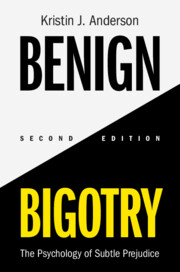Refine search
Actions for selected content:
2 results
Introduction
-
- Book:
- Benign Bigotry
- Published online:
- 22 November 2024
- Print publication:
- 05 December 2024, pp 1-15
-
- Chapter
-
- You have access
- HTML
- Export citation

Benign Bigotry
- The Psychology of Subtle Prejudice
-
- Published online:
- 22 November 2024
- Print publication:
- 05 December 2024
